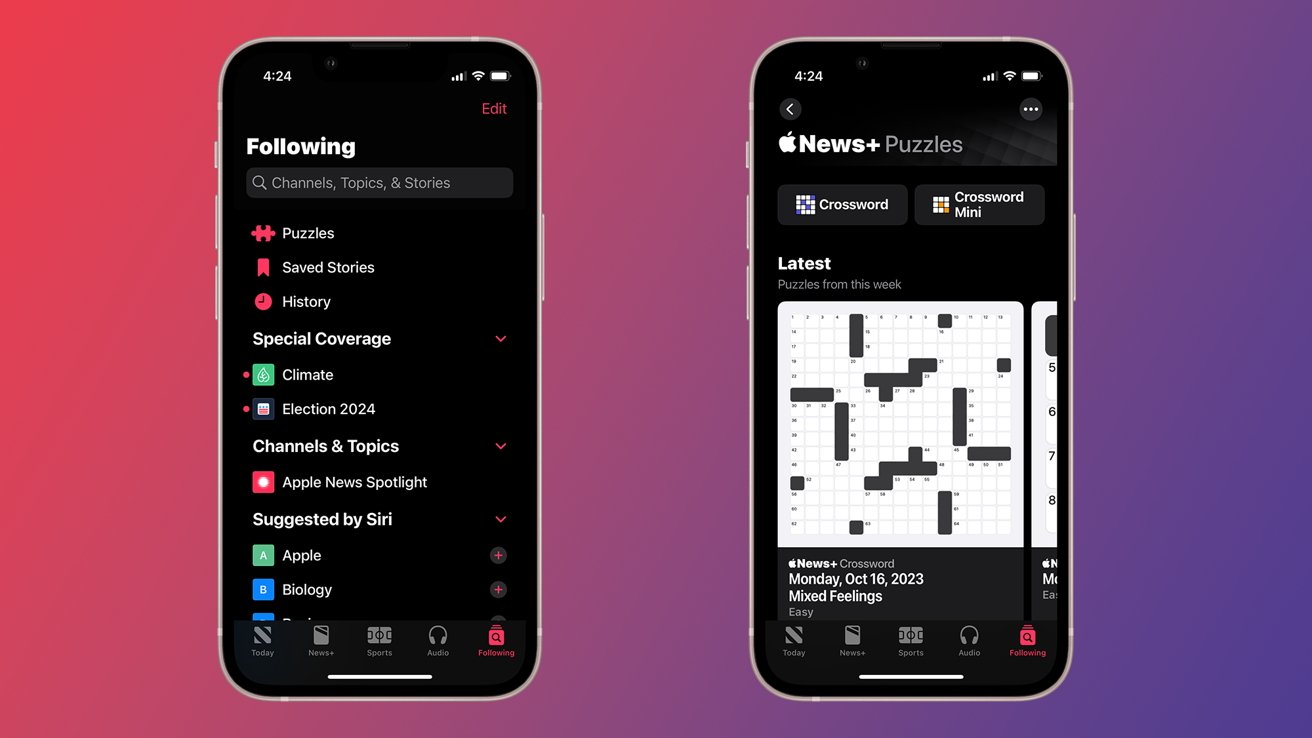Recovering after a second chance afforded me by Collision Detection on my Apple Watch, I'm hoping Apple will spare me once again, this time from the ad avalanche inherent across online social engagement monetization.
I'm loving that Apple News in iOS 17 has a new daily selection of crossword puzzles and would love to see more new ad-free content from the company in that direction. Perhaps the world needs more engagement in intellectual exercise and less doomscrooling through vapid social media engagement monetized by incessant ads.
An intellectual exercise
Rather than just feeding you, the consumer, pre-slanted ideas prepared for simple digesting, Apple News' new crossword puzzles take you out of the surveillance advertising world of the open Internet and instead lure you into a different sort of engagement: thinking on your own.
Without much fanfare, Apple News floated out a regular daily feature of crossword puzzles in two formats: a mini puzzle that can be knocked out in a minute or so, and a larger puzzle served up in various levels of difficulty, which takes me about half an hour to solve.
![More ads are appearing in my notifications [left] while Apple's crossword is starting to become one [right]](https://photos5.appleinsider.com/gallery/57243-116458-adsinapple-xl.jpg) More ads are appearing in my notifications [left] while Apple's crossword is starting to become one [right]
More ads are appearing in my notifications [left] while Apple's crossword is starting to become one [right]Reminiscent of some Apple TV shows, the clues and answers of Apple News' crosswords make occasional references to the company's platform of apps, as well as reflecting its touted corporate values with regard the environment and its ready recognition of prominent women and minorities.
There's even frequent appearances of emojis in the clues, as if Apple really wanted to evoke classic newspaper nostalgia while also elevating the experience into the current world of the 2020s. There's also the option to share a crossword via AirDrop. Perhaps iOS 18 will introduce "FaceTime clue collaboration."
Olds old is the new News
Harkening from an earlier era where printed crossword puzzles were a sort of proto-video game before videos even existed, these 2D brain teasers force you to decipher clever word play, recall names pulled from current events and chose between multiple potential solutions to the clues to find the specific words that all fit together as intended.
Crosswords are a reminder that your first attempt to answer to a question might be correct on some level, but may need revising as other factors come into view.
Rather than just being chewed up answers that are fed to you as plainly as possible in an edited story — with the option to ignore the overall premise as "fake news" if you like — if you chose not to accept the answers in front of you in a crossword, you simply lose the game.
Just as with other games, from football to poker, the rules are unignorably there in black and white. In the world of crosswords, if your personal opinion doesn't fit in the spaces provided or doesn't line up with the predetermined to be correct responses of the puzzles' intersecting words, nobody cares!
There no place to express your disgruntlement with an answer or its clue, and conversely, you don't have to wade through anyone else's wingnut feedback as you work to solve the puzzle. If you "choose not to agree" with a crossword answer, you are simply wrong; game over.
Out with ethics, in with the Internet!
This is a refreshingly traditional approach to knowledge that has gone missing from the world of journalism in recent years. Today, what passes for journalism in our post-truth society is often simply a recounting of various random opinions on a subject, with most seemingly selected to evoke outrage or shock. You can blame the Internet for that.
Sure there were lies and bias and propaganda before the Internet, but these were also exposed and overturned by journalists who sought to get to the bottom of things to unearth "truth," even as our understanding of truth incrementally evolved as we came to collectively accept various realities as our civilization evolved.
News used to strive to make us smarter and better prepared to understand the world, a science of sorts that proposed theories and attempted to determine if they were correct or not. The scientific striving of journalism was generally paid for by advertising, but the reporting and the advertising that financially made it possible were religiously kept separate by a holy codex of professional ethics.
In recent decades, the high priests of old world journalism were sucker punched by upstart tech bros who devised alternative information superhighways that bypassed stuffy editorial boards and allowed you the reader to reach your own conclusions based on whatever breadcrumb trail of hyperlinked facts you chose to follow.
Perhaps doing your own research' could lead you to decide that the world was actually flat, that lifesaving medicines were a conspiracy, and that your neighbor isn't really a person and therefore doesn't have any inalienable rights after all.
You might even come to the conclusion that eating packets of soap would make you cool, because apparently everyone else was eating them too. You could even find videos depicting this reality, or any other reality of your choosing.
You could also choose to dismiss any (or all!) the findings of the past few centuries of science. You could even choose to simply deny all the layers of humanity's progress in everything from civil rights to our basic understanding that to have a functional society, we have to compromise and respect each other.
The Internet that was supposed to link together and share our intelligence and knowledge instead became a place where being stupid made you a celebrity instead of a laughingstock, and the very concept of truth or decency became harder to defend to critics than the adolescent fantasy of Communism.
Rather than accepting the reality that civilization is a joint effort to build a better future together, "reality" in the new metaverse is whatever momentarily trends as fashionable, regardless of whether it's actually an improvement — or even real.
On the internet. your own personal reality can be whatever you want to be, just like your own sense of style— or whatever your tiny pocket niche of interweb society tells you it should be today. You can even create a reality for yourself that contradicts itself, or adopt a particular reality that works for you and then deny others the same.
Imagine an aging white guy (such as myself) seeking out a facelift and testosterone therapy to better align my external appearance with my inner sense of the virile, masculine young man I identify as— but then turning around and waging my finger at the generation behind me as if they shouldn't have the same rights of self determination.
On the internet, your own whims— no matter how flimsy or toxic— can trump everyone else's rights, if you can shout them out loud enough and attract a monetizeable crowd of followers.
Before the internet, if people wanted to be Nazis or Flat Earthers or John Birchers or refuse medical care for their children, they'd have to really devote some effort in the face of social resistance. Today it has become controversial to protest oppression and violence, while nazi soapboxes are handed out for free— and then then promoted— by America's richest man, the new owner of the world's tootiest horn pipes.
If you're a profoundly stupid moron or a classless, hateful bore or vitriolic liar and all-around dumpster fire, there's no end to the microphones seeking to amplify your rantings at no charge to you.
The scourge of surveillance advertising
Why? It's all because the internet's surveillance advertising has created a massive pipe of money that flows fastest when society is pushed backward.
The more disgusting or stupid or destructively false and damaging an idea is, the more outraged eyeballs it can attract— whether they support it, laugh at it, or are so aghast they have to investigate this awful curiosity in more detail. Even self-styled intellectual critics become propagators of trash, if only to point out to everyone how absurd it is and how it should consume them to be upset about nonsense and garbage.
Force the vile honeypot of "engagement" in people's faces and then sandwich it between interstitial ad messages and you get the power of old media journalism on steroids, without having to pay anyone to care about ethics or facts or even spelling or basic logic.
Bust down that righteous firewall between journalistic content and the paid commercial messages (that once supported their careful construction from a respectful distance) then fire the journalists and their editors and all the moderators and anyone with any principals at all, and now you're getting paid to display content you don't even need to create yourself.
The world is full of people willing to shovel out garbage content that has zero value, or perhaps negative value— generally for free!
You can pay a few "influencers" of unclear value to concoct an illusionary depiction of some invented reality with catchy or at least fleetingly attention-grabbing images or video clips. They might attract huge audiences who will devote hours of their time to surf through the never ending waves of trash just to feel something— perhaps an ephemeral emotional chord that makes them laugh out loud' at least in the textual meme sense, not actually laughing nor doing anything out loud. As they like, repost and plagiarize, you monetize!
At least "1984" featured a girl with a hammer
Before the emergence of the commercial Internet, we imagined the worst possible dystopian future as being oppressed by an all-controlling centralized state that tries to force everyone to believe senseless, contradictory newspeak' rubbish.
Thanks to Internet advertising, that can follow our train of thought and then railroad us down whatever path we click — whether surreptitious guided or pushed along without any guard rails at all — we've ended up in a place as bleak as 1984' but far stupider.
So many people today choose to believe in any conspiracy apart from the one we are actually sitting in, where every layer of the stack is optimized only to deliver ad revenue via outrage-inciting engagement metrics.
The Big Brother of surveillance advertising decrees how long even a how-to video clip must be, forcing us to trudge through padding that ensures we watch as many ads as possible before we are allowed a meager parcel of useful information.
Want to quickly catch up with friends or chat about current events? Here's an ad for something you just bought, and here's some outrageous thing a member of another party said, twisted around to be particularly absurd! Here's a link to a rabbit hole, but first another ad and then some random video clip of who knows what to distract you like the intentionally disorienting inside of a casino. How is it 5 am already?
Apple, save society as you save the world
So it's refreshing that Apple News now offers a new alternative for our attention that doesn't seek to radicalize our worst impulses or outrage us with catchy headlines that provoke us to click through and rubberneck at whatever dumpster some algorithm has determined will catch fire and burn the hottest between the paid commercial breaks that just barely keep that garbage glowing hot enough to demand our attention.
Of course, Apple does show ads in some places as well, but its revenues largely come from upfront sales of hardware and services that are real, rather than shoveling together piles of outrageous but cheap content to trick people into "being the product."
Even so, despite offering— with incredible success— an alternative business model to the surveillance advertising pursued by most of its tech rivals, Apple has unfortunately been tiptoeing toward incrementally serving up the same turd sandwich.
iOS push notifications were supposed to steer clear of ads
Most notably, Apple has allowed its own push notification servers to be increasingly co-opted by developers and merchants to serve as yet another conduit of ads and spam. Remember when Steve Jobs insisted that the company's newly minted push notifications wouldn't allow ads?
Sadly Apple's current leadership has dropped the ball here while focusing attention instead on planting forests and reducing its carbon footprint.
Climate change certainly is a bigger and more important issue than just having our time wasted with an incessant river of pure advertising alerts that break a clear assurance we were offered by the company way back in the days of iOS 3 (in 2009!) that this would never be allowed to happen.
However, Apple can walk and chew gum at the same time, as it's demonstrated in this latest version of Apple News that offers crosswords as an enjoyable, edifying reprieve from the rivers of modernist both-sides bullshit journalism freely flowing through the rest of Apple News.
Apples "News" partners clearly lean on AI to generate a lot of low value, placeholder content which serves no purpose other than to frame the company's hedged bet of dangerously inching toward the regressive culture of surveillance advertising snuck between the illusion of self curated reality.
So perhaps in between seeding new mangroves and ditching leather and so on, Apple should make a serious course correction away from being just another Meta/X/Google and instead step on the brakes of notification spam to reduce its growing footprint in the area of intellectual climate change.
It would be such a waste to save the world but then end up with a valueless, dumbed down society that foolishly traded away its golden humanity for the shiny tin nickel of surveillance advertising.
So please, Apple, more content of value like News' new crosswords and let's get a handle on this out of control notification ad spamming.
 Daniel Eran Dilger
Daniel Eran Dilger










-m.jpg)






 Malcolm Owen
Malcolm Owen

 William Gallagher
William Gallagher
 Chip Loder
Chip Loder
 Brian Patterson
Brian Patterson
 Christine McKee
Christine McKee
 Wesley Hilliard
Wesley Hilliard
 Amber Neely
Amber Neely
-m.jpg)






16 Comments
The Google anti-trust trial has revealed Apple gets a 36% cut of Google's ad revenue from Safari.
DED on a soapbox…love it. I am glad someone still has the energy.
first thing i do when i install any app is disable notifications and location (unless it really needs location)
only about 5 or 6 apps on my iphone have notifications turned on
the vast majority of apps DO NOT need notifications, although they would all love to have it turned on
no game needs notifications
maybe bank apps for when you use your credit/debit card
ebay (for auctions)
espn (for when my teams score)
whatsapp/signal/imessage etc
thats about it
Well-thought-out article. Thanks for the insight. I just hope that Apple holds its head high and spurns ads. Fingers and toes crossed. It’s a toxic world out there where real journalism has gone to die.